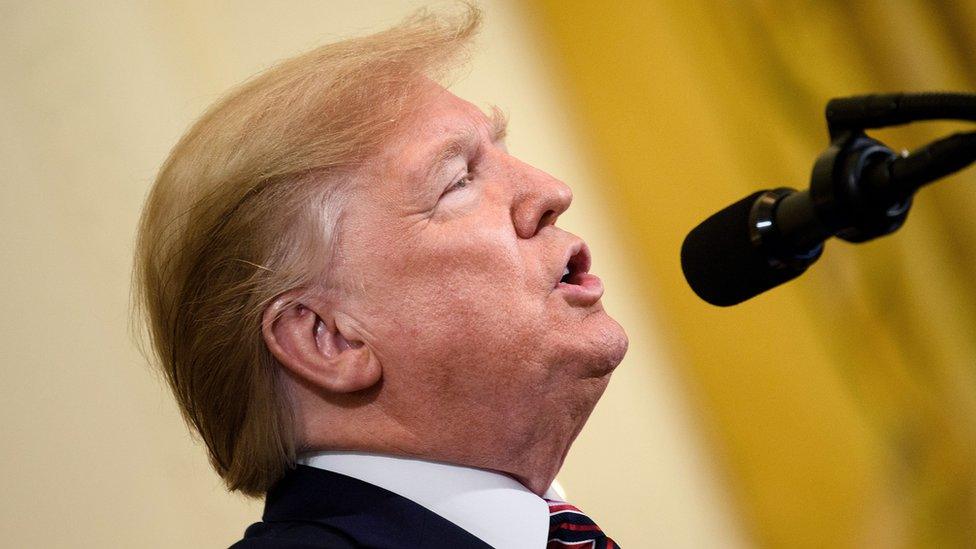Trump says US and China 'very close' to trade deal
- Published

Wall Street share markets hit a record high on signs of an imminent pause in the trade war between the US and China.
Business chiefs who met White House officials on Thursday hinted that a deal could come this week.
It would avert another round of tariffs that the US was due to impose on China on Sunday.
President Donald Trump has been meeting his trade advisers, and tweeted earlier that the US and China were "very" close to a deal.
"They want it and so do we!" he wrote.
The US has reportedly offered to halve tariff rates on about $350bn worth of Chinese goods, some of which had climbed as high as 25%. In exchange, China would commit to boost its purchases of US agricultural products.
Allow Twitter content?
This article contains content provided by Twitter. We ask for your permission before anything is loaded, as they may be using cookies and other technologies. You may want to read and before accepting. To view this content choose ÔÇÿaccept and continueÔÇÖ.
However, the so-called Phase One deal is not expected to address many of the more difficult issues that triggered the fight, like China's subsidies for certain industries.
"It's a good starting point," Chamber of Commerce head of international affairs Myron Brilliant told broadcaster CNBC after the White House meeting.
The hints of progress sent the main US stock indexes up about 1%.
A deal would deliver a victory to Mr Trump, who is under political pressure, with debate on his impeachment underway in the US Congress.
As described, the potential agreement falls short of what the US initially said were its goals, said Jennifer Hillman, a senior fellow at the Council on Foreign Relations and a former trade official.
"This should NOT be described as a trade agreement," she wrote on Twitter.
"It is a purchase and sale agreement that does virtually nothing to address substantive concerns of US (+rest of the world) with China's trade practices."
Allow Twitter content?
This article contains content provided by Twitter. We ask for your permission before anything is loaded, as they may be using cookies and other technologies. You may want to read and before accepting. To view this content choose ÔÇÿaccept and continueÔÇÖ.
Mr Trump has repeatedly claimed progress toward a deal that would end the trade war, which has seen tariffs imposed on more than $450bn worth of US-China trade and weighed on the global economy.
In October, he announced that the two sides had agreed to terms for a "Phase One", but negotiations dragged on.
Without progress, the US had threatened to impose tariffs on more than $150bn worth of Chinese exports on 15 December.
Previous rounds of tariffs had largely spared the US consumer, the main driver of the US economy. But this time, the tax was expected fall on a wide range of everyday goods, including smartphones, children's books, footwear and clothing.
Goldman Sachs analysts estimated that US economic growth could be 0.4% lower next year, without some sort of deal to avoid the next tariffs and roll back some of those already in place.
White House officials have downplayed the risks, arguing the tariffs are aimed at making China give up "unfair" trade practices, such as alleged intellectual property theft.
- Published12 December 2019
- Published16 January 2020
- Published11 October 2019